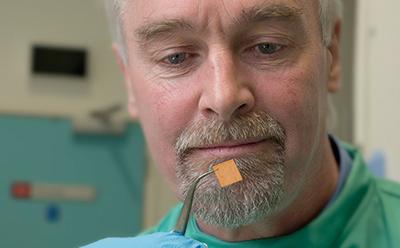Antimicrobial Copper on the BBC World Service

An interview with Professor Bill Keevil of the University of Southampton features in the 18th June edition of Business Daily on the BBC World Service, which focuses on copper's essential contribution to modern living.
Professor Keevil - the UK's foremost expert on the antimicrobial properties of copper - explains how solid copper and copper alloys rapidly eliminate dangerous pathogens on contact, which he and his team have explored extensively in the laboratory. In real-world situations, this translates into a reduced risk of bacteria or viruses being deposited on a surface by one person, then picked up on the hands of another, potentially causing an infection.
The Southampton team has developed two types of test - one simulating a contaminated hand transferring pathogens to a surface, and the other simulating a 'wet contamination event' such as a sneeze or a splash - and in both copper rapidly eliminates large loads of bacteria and viruses. This research was taken into a clinical setting - in the intensive care units of three US hospitals - where a trial demonstrated that replacing just six frequently-touched surfaces around a patient with solid copper or copper alloy equivalents reduced their risk of acquiring a healthcare-associated infection by 58%. Asked how quickly we could see copper surfaces installed in hospitals across the world, Professor Keevil explains 'It's rolling out already. For example, in Chile, the UK, Ireland, in Australia, China and Japan. At the moment it's happening in just a few numbers in each of the countries, but the fact that it's happening on a global scale means, I think, that it's about to take off.'
But won't these pathogens evolve resistance to copper? Professor Keevil thinks not.
'When people have looked at the antibiotic world,' he says, 'that's exactly what's happened. The difference for copper is it works in completely different ways to antibiotics or common biocides.
'It punches a hole in the cell membrane, like a balloon, and the bacteria collapse... It stops them respiring, goes into the cell and destroys their DNA, which is the important fact, I believe.
'Mutation happens because you get small changes in DNA in cells. The beauty of copper is it destroys the DNA; there is nothing left. We've shown this for bacteria, fungi and viruses... They can't mutate. They have no time, no chance to mutate. They're gone.'
It's rolling out already. For example, Chile, the UK, Ireland. At the moment it's happening in just a few numbers in each of the countries, but the fact that it's happening on a global scale means, I think, that it's about to take off.It's rolling out already. For example, Chile, the UK, Ireland. At the moment it's happening in just a few numbers in each of the countries, but the fact that it's happening on a global scale means, I think, that it's about to take off.
Listen to the full programme Copper (Cu) - Materials on the BBC World Service site. Professor Keevil's segment begins at 37:50.
Related Staff Member
Other University of Southampton sites
Links to external websites
The University cannot accept responsibility for external websites.
